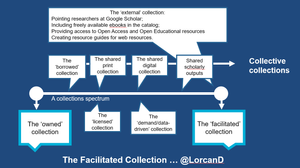One of the recurrent themes in these pages is that systemwide coordination of print materials is necessary as libraries begin to retire collections – to offsite storage or removing them altogether. There are various drivers here: the demands on space, the emergence of a digital corpus, the cost of managing a resource that releases progressively less value in research and learning. Print runs of journals have been an early focus, but interest is extending to books also. I believe we are moving to a situation where network-level management of the collective collection becomes the norm, but it will take some years for service, policy and infrastructure frameworks to be worked out and evolution will be uneven. The network may be at the level of a consortium, a state or region, or a country. At the moment, this trend is manifesting itself in a variety of local or group mass storage initiatives, as well as in several regional and national initiatives.
Last week, I came across interesting discussions of two of the more high profile initiatives in this area. These are WEST: toward a Western Regional Storage Trust, a US consortium of institutions, and the UK Research Reserve, a national approach.
Karen Schneider discusses West, placing it in the context of her own library’s needs to reclaim space to meet local needs.
But the most significant infrastructure issue faced by the library facility is that the bulk of the space is occupied by very-low-use materials: books and journals.
In the mid-1950s, it made sense that the bulk of the library’s space needs were occupied by then-state-of-the-art information tools. But the only way our library can maintain relevance is to reclaim the bulk of this space for 21st-century services such as information literacy instruction, faculty technology development, group study, and cultural events. We are not a museum for obsolete information technologies; to again quote our beloved Ranganathan, “The library is a living organism.” [Free Range Librarian]
The UKRR was a central topic at the Dare to Share conference organized by the British Library’s Preservation Advisory Centre and Research Libraries UK to consider preservation as a part of collective approaches to print management. I was not at this event, but it generated very interesting twitterage, the presentations are now available online, and University of Huddersfield archivist, Sarah Wickham, has written a brief report of the day’s discussions.
A presentation by Deborah Shorley [PDF] describes the UK Research Reserve: “UKRR is a HEFCE-sponsored scheme which helps UK university libraries dispose of their low use research journals, safe in the knowledge that one copy will be kept in BLDSC, with two backup copies in other UKRR libraries” (HEFCE – Higher Education Funding Council for England. BLDSC – British Library Document Supply Centre). The local reationale is raised to the national level: “We must manage our national research information infrastructure responsibly; Print material is becoming less important to researchers; UK universities urgently need more space to do their work; We can no longer cope with the ever-expanding collections in our university libraries”.
Each of these discussions notes the importance of data: to make sensible decisions you need to have good intelligence abot the collective collection of which individual libraries are part. Holdings and circulation data, especially, come to mind. This point is also raised in the very interesting presentation by Brian Clifford, which focuses on the management of books at Leeds University. [PDF] He introduces an interesting collections typology, as a way of framing different dymanics at work across the collection:
[Heritage or legacy?]
- Heritage: Significant & distinctive collections which continue to be developed
- Legacy: Significant & distinctive collections: historic strengths but no longer added to
- Self-renewing: Supporting current research & teaching
- Finite: No longer relevant – can be considered for withdrawal
Brian goes on to discuss action at local, regional and national level if the library’s responsibility to their own users and to the scholarly print record are to be met.
As can be seen, the move to shared responsibility for print raises major service and policy issues, as well as very practical management issues.
An effective and efficient approach will depend on good intelligence in the form of aggregate data about collections (and Karen discusses OCLC in this context). Brian Clifford notes the balance between metrics and local knowledge in making judgements. Local knowledge will always be important, but it does seem that to scale across many institutions some shared decision criteria which can be operationalised through available data resources will be required.



